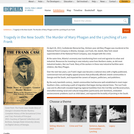
On April 26, 1913, Confederate Memorial Day, thirteen-year-old Mary Phagan was murdered at the National Pencil Company in Atlanta, Georgia. Leo Frank, the Jewish, New York-raised superintendent of the National Pencil Company, was charged with the crime. At the same time, Atlantas economy was transforming from rural and agrarian to urban and industrial. Resources for investing in new industry came from Northern states, as did most industrial leaders, like Leo Frank. Many of the workers in these new industrial facilities were children, like Mary Phagan. Over the next two years, Leo Franks legal case became a national story with a highly publicized, controversial trial and lengthy appeal process that profoundly affected Jewish communities in Georgia and the South, and impacted the careers of lawyers, politicians, and publishers. By the early twentieth century, Jewish communities had become well-established in most major Southern cities, continuing a path of migration that began during colonial times. The Leo Frank case and its aftermath revealed lingering regional hostilities from the Civil War and Reconstruction, intensified existing racial and cultural inequalities (particularly anti-Semitism), embodied socioeconomic problems (such as child labor), and exposed the brutality of lynching in the South. The exhibition was created by the Digital Library of Georgia (http://dlg.galileo.usg.edu/). Exhibition Organizers: Charles Pou, Mandy Mastrovita, and Greer Martin.
- Subject:
- History
- U.S. History
- Material Type:
- Diagram/Illustration
- Primary Source
- Unit of Study
- Provider:
- Digital Public Library of America
- Provider Set:
- DPLA Exhibitions
- Author:
- Charles Pou
- Greer Martin
- Mandy Mastrovita
- Date Added:
- 11/01/2015